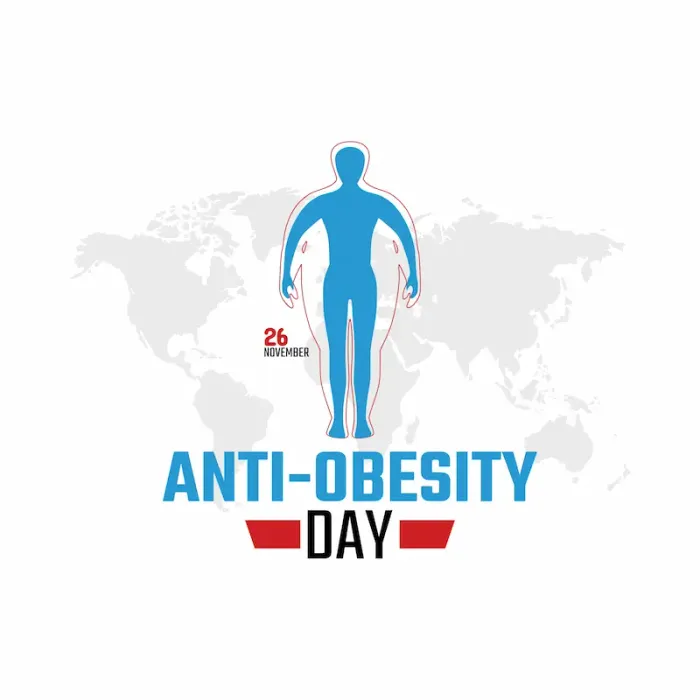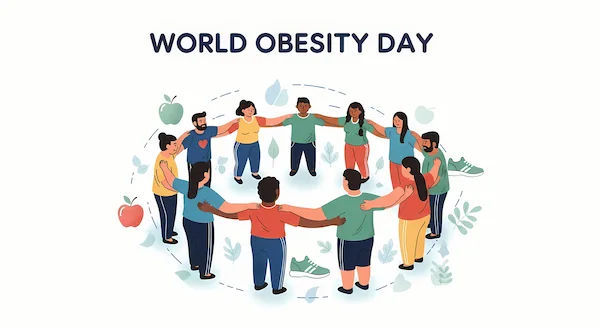Your Essential Guide to Anti Obesity Day Facts, Risks & Solutions
Discover your essential guide to Anti Obesity Day. Learn key facts, health risks, and practical solutions to prevent and manage obesity effectively.

Written by Dr. M L Ezhilarasan
Reviewed by Dr. Shaik Abdul Kalam MD (Physician)
Last updated on 13th Jan, 2026

Introduction
Every year, Anti Obesity Day serves as a crucial global reminder of an escalating health crisis that affects millions. It’s more than just a day on the calendar; it's a call to action, a moment for education, and an opportunity for communities to unite against obesity. This complex condition, characterised by excessive body fat that increases health risks, has reached epidemic proportions worldwide. But amidst the alarming statistics lies a message of hope: obesity is largely preventable and manageable. This guide will walk you through everything you need to know—from understanding the root causes of obesity in adults to adopting practical, sustainable solutions for a healthier life. We'll explore the significance of this day, break down the science, and provide actionable steps you can take, not just today, but every day, to protect your well-being.
What is Anti Obesity Day and Why Does It Matter?
The Global Mission Behind the Day
Observed annually on November 26th, Anti Obesity Day is an initiative dedicated to raising awareness about the dangers of obesity and promoting solutions for its prevention and management. It was established to trigger a global conversation, encouraging individuals, families, healthcare providers, and policymakers to address the environmental, social, and dietary factors contributing to this public health issue. The day emphasises that combating obesity requires a collective effort, moving beyond individual responsibility to societal change.
The Alarming Rise of Obesity: A Look at the Numbers
The data surrounding obesity is staggering. According to the World Health Organisation (WHO), worldwide obesity has nearly tripled since 1975. In 2016, over 1.9 billion adults were overweight, and of these, over 650 million were obese. Perhaps more concerning is the rise in childhood obesity prevention efforts, as over 340 million children and adolescents aged 5-19 were overweight or obese in 2016. These numbers are not just statistics; they represent a profound strain on healthcare systems and a diminished quality of life for those affected, making the mission of Anti Obesity Day more critical than ever.
Consult a Bariatrician for the best advice
Understanding Obesity: More Than Just Weight
How is Obesity Measured? BMI and Beyond
The most common screening tool for obesity is the body mass index (BMI), a simple calculation of weight relative to height. A BMI of 30 or higher is generally classified as obese. However, it's important to remember that BMI is a starting point, not a definitive diagnosis. It doesn’t distinguish between muscle and fat. Other methods, like waist circumference and body fat percentage analyses, provide a more nuanced view of health risks, particularly abdominal fat, which is strongly linked to metabolic issues.
Root Causes: Why Obesity Occurs
Obesity is not a simple result of overeating. It's a multifactorial disease influenced by a combination of factors:
Lifestyle and Dietary Factors
The modern environment promotes weight gain. Diets high in processed foods, sugars, and unhealthy fats, coupled with increasingly sedentary lifestyles (desk jobs, screen time, reliance on vehicles), create a perfect storm for weight gain. This energy imbalance—consuming more calories than you burn—is a primary driver.
Genetic and Hormonal Influences
Science shows that genetics can affect how your body processes food, stores fat, and regulates appetite. Hormones like leptin and ghrelin, which control hunger and satiety, can malfunction in individuals with obesity, making it physiologically harder to maintain a healthy weight.
Psychological and Environmental Triggers
Stress, anxiety, depression, and poor sleep can lead to emotional eating and hormonal changes that promote weight gain. Furthermore, your environment—limited access to healthy food options (food deserts) or safe places to exercise—can significantly impact your ability to make healthy choices.
The Domino Effect: Serious Health Risks of Obesity
Obesity is a major gateway to numerous non-communicable diseases, acting as a catalyst for a cascade of health problems.
Cardiovascular Diseases and Metabolic Syndrome
Excess weight forces your heart to work harder, increasing blood pressure and raising levels of bad cholesterol (LDL) and triglycerides while lowering good cholesterol (HDL). This combination, often called metabolic syndrome, dramatically increases the risk of coronary heart disease, stroke, and heart failure.
The Strong Link Between Obesity and Type 2 Diabetes
Perhaps the most well-established link is between obesity and Type 2 diabetes. Excess fat, particularly abdominal fat, causes cells to become resistant to the hormone insulin. This insulin resistance is the primary precursor to developing diabetes, a chronic condition that requires lifelong management.
Other Associated Health Complications
The risks of being overweight extend far beyond the heart and metabolic systems. Obesity is a known risk factor for:
• Certain cancers (endometrial, breast, ovarian, prostate, liver, gallbladder, kidney, and colon).
• Sleep apnea and severe breathing problems.
• Osteoarthritis due to increased stress on joints.
• Fatty liver disease.
• Kidney disease.
• Mental health issues like depression and low self-esteem.
Taking Action: Effective Strategies for Obesity Prevention and Management
The good news is that even a modest weight loss of 5-10% of your total body weight can lead to significant health improvements, such as lowered blood pressure and blood sugar levels.
Building a Sustainable and Nutritious Diet Plan
Fad diets rarely work long-term. Focus on a balanced, sustainable best diet for obesity management that includes:
• Whole Foods: Prioritise fruits, vegetables, whole grains, and lean proteins.
• Portion Control: Be mindful of serving sizes.
• Hydration: Drink plenty of water and avoid sugar-sweetened beverages.
• Limit Processed Foods: Reduce intake of high-sugar, high-fat, and high-sodium packaged foods.
Incorporating Physical Activity into Your Daily Life
The WHO recommends at least 150 minutes of moderate-intensity aerobic activity per week for adults. This doesn't necessarily mean the gym. Brisk walking, cycling, dancing, or even active gardening count. Find an activity you enjoy to make it a consistent part of your routine.
The Role of Behavioural Therapy and Mindful Eating
Addressing the psychological relationship with food is key. Techniques like mindful eating—paying full attention to the experience of eating—can help you recognise hunger cues and prevent overeating. Behavioural therapy can help develop strategies to overcome emotional eating and build healthier habits.
When to Seek Professional Help
If you have struggled to lose weight on your own, or if your BMI is in the obese range, it’s crucial to seek guidance. If your condition does not improve after trying these methods, book a physical visit to a doctor with Apollo24|7. Healthcare professionals can rule out underlying medical conditions, provide personalised weight management tips, and discuss all available options, including:
• Structured weight management programs.
• Prescription medications for weight loss.
• In some cases, bariatric surgery may be considered for severe obesity.
For those needing baseline health metrics, Apollo24|7 offers convenient home collections for tests like vitamin D or HbA1c, which are crucial for understanding your metabolic health.
Conclusion: A Collective Journey Towards Health
Anti Obesity Day is a powerful symbol, but its true value is realised through the actions we take every day. Overcoming obesity is not a solitary sprint but a collective marathon towards better public and personal health. It requires individuals making informed choices, families fostering supportive environments, and societies building healthier infrastructures. Remember, the goal isn't perfection but progression. Start with one small change—swap a sugary drink for water, take a 15-minute walk, or add an extra vegetable to your dinner. By understanding the causes and solutions, we can shift the narrative from blame to empowerment. This November 26th, let’s commit to being more aware, more active, and more supportive of each other in the journey toward lifelong wellness.
Consult a Bariatrician for the best advice
Consult a Bariatrician for the best advice

Dr. Anand Ravi
General Physician
2 Years • MBBS
Bengaluru
PRESTIGE SHANTHINIKETAN - SOCIETY CLINIC, Bengaluru

Dr. Sunil Kaul
General Surgeon
30 Years • MBBS, MS, FICS, FIMSA, FMAS
Delhi
Apollo Hospitals Indraprastha, Delhi
(25+ Patients)

Dr. Saket Goel
General Surgeon
27 Years • MBBS, MS (Surg.)
Delhi
Apollo Hospitals Indraprastha, Delhi
(125+ Patients)

Prof Dr Pawanindra Lal
Minimal Access/Surgical Gastroenterology
31 Years • MS, DNB, FCLS, FRCS(Ed,Glasg,Eng,Irel), FACS, FAMS, FFSTEd
Delhi
Apollo Hospitals Indraprastha, Delhi
(125+ Patients)

Dr. Neha Shah
Bariatrician
23 Years • MBBS, MS, FIAGES, FAIS, FMAS, FMIS, FALS
Chennai
The Good Weight, Chennai
Consult a Bariatrician for the best advice

Dr. Anand Ravi
General Physician
2 Years • MBBS
Bengaluru
PRESTIGE SHANTHINIKETAN - SOCIETY CLINIC, Bengaluru

Dr. Sunil Kaul
General Surgeon
30 Years • MBBS, MS, FICS, FIMSA, FMAS
Delhi
Apollo Hospitals Indraprastha, Delhi
(25+ Patients)

Dr. Saket Goel
General Surgeon
27 Years • MBBS, MS (Surg.)
Delhi
Apollo Hospitals Indraprastha, Delhi
(125+ Patients)

Prof Dr Pawanindra Lal
Minimal Access/Surgical Gastroenterology
31 Years • MS, DNB, FCLS, FRCS(Ed,Glasg,Eng,Irel), FACS, FAMS, FFSTEd
Delhi
Apollo Hospitals Indraprastha, Delhi
(125+ Patients)

Dr. Neha Shah
Bariatrician
23 Years • MBBS, MS, FIAGES, FAIS, FMAS, FMIS, FALS
Chennai
The Good Weight, Chennai
More articles from Obesity
Frequently Asked Questions
1. What is a healthy BMI range?
A BMI between 18.5 and 24.9 is generally considered a healthy weight range for adults. However, it's best to discuss your BMI with a doctor, as it doesn't account for muscle mass or body composition.
2. Can you be obese and still be metabolically healthy?
While some individuals with obesity may not show immediate metabolic issues (like high blood pressure), they are still at a higher long-term risk for developing conditions like cardiovascular disease compared to those in a healthy weight range. This is often referred to as the 'obesity paradox,' but it doesn't mean the excess weight is without risk.
3. What are the first steps to prevent obesity in children?
Focus on building healthy habits: encourage daily physical play, provide a balanced diet rich in fruits and vegetables, limit screen time, and ensure they get adequate sleep. Lead by example and create a positive, health-focused home environment.
4. Are weight loss surgeries a safe option?
Bariatric surgery can be a highly effective tool for treating severe obesity when other methods have failed. It is generally safe when performed by an experienced surgical team, but it is a major procedure with lifelong dietary and nutritional implications. It requires a thorough evaluation and commitment to lifestyle changes.
5. How does stress contribute to weight gain?*
Chronic stress elevates the hormone cortisol, which can increase appetite and drive cravings for high-fat, high-sugar 'comfort foods.' It can also encourage the storage of fat, particularly in the abdominal area.



.webp)
